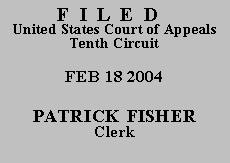 UNITED STATES COURT
OF APPEALS
UNITED STATES COURT
OF APPEALS
 UNITED STATES COURT
OF APPEALS
UNITED STATES COURT
OF APPEALS
| UNITED STATES OF AMERICA, |
No. 03-3172 (D.C. No. 02-3171-JTM) (D. Kan.) |
On June 13, 2000, Jose Cipriano Mendias-Chavez pleaded guilty to illegal re-entry to the United States by a deported aggravated felon pursuant to 8 U.S.C. §§ 1326(a) and (b)(2). On December 7, 2000, Mendias-Chavez was sentenced to a term of sixty months imprisonment, three years supervised release, and a $100 special assessment. We affirmed Mendias-Chavez' sentence on June 5, 2001. Twenty days later, on June 25, 2001, the Supreme Court held that certain aliens remained eligible for a discretionary waiver of deportation. See INS v. St. Cyr, 533 U.S. 289, 326 (2001).
Mendias-Chavez, who had not been informed of his eligibility for a discretionary waiver prior to his deportation, filed a § 2255 motion in federal district court seeking an order vacating or setting aside his sentence pursuant to St. Cyr. There, he argued for the first time that his initial deportation, which followed his conviction for an aggravated felony, violated his due process rights. Relying on Fourth Circuit precedent, the district court denied the § 2255 motion, holding that Mendias-Chavez failed to establish a due process violation that would sustain a collateral attack on his deportation. United States v. Mendias-Chavez, No. 00-10093-01-JTM, slip op. at 3 (D. Kan. May 27, 2003); see United States v. Wilson, 316 F.3d 506, 515 (4th Cir. 2003). Mendias-Chavez then sought a certificate of appealability from this court, which we granted as to the following question: Whether the Immigration Judge's failure to inform Mendias-Chavez of his eligibility for a discretionary waiver of deportation rendered his underlying deportation order fundamentally unfair such that his § 1326 conviction is defective.
First, the government contends that Mendias-Chavez' argument under St.Cyr is procedurally barred because he failed to raise a due process challenge to his § 1326 conviction on direct appeal. Mendias-Chavez maintains that St. Cyr relief was not available at the time of his direct appeal. The Tenth Circuit has not yet had the opportunity to explore whether St. Cyr applies retroactively. However, we need not and do not address this question, "because the case may be more easily and succinctly affirmed on the merits." Miller v. Mullin, 354 F.3d 1288, 1297 (10th Cir. 2004) (quotation omitted). Indeed, our recently published decision in Aguirre-Tello, decided shortly after this court granted a certificate of appealability to Mendias-Chavez, clearly bars relief for Mendias-Chavez in this matter. "When a previous deportation proceeding is attacked on constitutional grounds, we are presented with a mixed question of law and fact, which we review de novo." Aguirre-Tello, 353 F.3d at 1204. Section 1326(d) permits an alien to collaterally challenge the validity of his underlying deportation order if three conditions are met: "(1) the alien exhausted any administrative remedies that may have been available to seek relief against the order; (2) the deportation proceedings at which the order was issued improperly deprived the alien of the opportunity for judicial review; and (3) the entry of the order was fundamentally unfair." 8 U.S.C. § 1326(d) (emphasis added). Mendias-Chavez thus has the burden of showing that the underlying deportation hearing was fundamentally unfair. Aguirre-Tello, 353 F.3d at 1204. In order to establish fundamental unfairness, "a defendant must show that (1) his due process rights were violated . . . and (2) he suffered prejudice as a result of the defects." Wilson, 316 F.3d at 510; see Aguirre-Tello, 353 F.3d at 120001.
Mendias-Chavez contends that the Immigration Judge's failure to advise him of his right to discretionary relief from deportation deprived him of his right to due process, thereby rendering his deportation fundamentally unfair. However, we rejected this exact argument in Aguirre-Tello, where we held that a deportable alien does not have a constitutional right to be informed of discretionary relief that might be available to him. 353 F.3d at 1204. Because Mendias-Chavez' argument is precluded by our en banc decision in Aguirre-Tello, we conclude that his conviction for illegal re-entry of a deported felon was not predicated on an unconstitutional deportation and AFFIRM.
ENTERED FOR THE COURT
Carlos F. Lucero
Circuit Judge
*. The case is unanimously ordered submitted without oral argument pursuant to Fed. R. App. P. 34(a)(2) and 10th Cir. R. 34.1(G). This order and judgment is not binding precedent, except under the doctrines of law of the case, res judicata, and collateral estoppel. The court generally disfavors the citation of orders and judgments; nevertheless, an order and judgment may be cited under the terms and conditions of 10th Cir. R. 36.3.